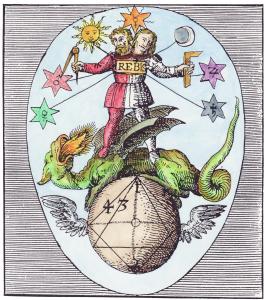Jung speaks about Mercurius and Alchemy
from Basil Valentine's Azoth
When the alchemist speaks of Mercurius, on the face of it he means quicksilver (mercury), but inwardly he means the world-creating spirit concealed or imprisoned in matter.
The dragon is probably the oldest pictorial symbol in alchemy of which we have documentary evidence.
It appears as the Ouroboros, the tail-eater, in the Codex Marcianus, which dates from the tenth or eleventh century, together with the legend ‘the One, the All’.
Time and again the alchemists reiterate that the opus proceeds from the one and leads back to the one, that it is a sort of circle like a dragon biting its own tail. For this reason the opus was often called circulare (circular) or else rota (the wheel).
Mercurius stands at the beginning and end of the work: he is the prima materia, the caput corvi, the nigredo; as dragon he devours himself and as dragon he dies, to rise again in the lapis.
He is the play of colours in the cauda pavonis and the division into the four elements.
He is the hermaphrodite that was in the beginning, that splits into the classical brother-sister duality and is reunited in the coniunctio, to appear once again at the end in the radiant form of the lumen novum, the stone.
He is metallic yet liquid, matter yet spirit, cold yet fiery, poison and yet healing draught – a symbol uniting all the opposites.”
Psychology and Alchemy
Part 3,
Chapter 3.1


Spiritus Meretricious the creator the destroyer god of all human makings, and natural birth in nature and its matrix as reflected inwardly–in the inner cosmos.
What a marvelous website such as jungcurrents.com to “stumble” across as I probed the worldwide web to learn more about Carl Jung — a fascination of mine as a retired octogenarian educator, ever since I completed a dissertation in Children’s Literature at New York University in 1991 entitled “An Analysis of Wilhelm Grimm’s’Dear Mili’ Employing von Franzian Methodological Processes.”
Trained in sociology and linguistics, I am not a psychologist, but nevertheless explored the Jungian concept of Individuation via my investigation of a Grimm’s fairytale — an indelible experience to my mercurial psyche. I’m forever indebted to this experience.